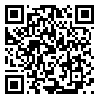BibTeX | RIS | EndNote | Medlars | ProCite | Reference Manager | RefWorks
Send citation to:
URL: http://rehabilitationj.uswr.ac.ir/article-1-47-en.html
Objective: By taking into account that understanding the primary needs of disabled girls and women is essential in finding a suitable solution to their problems, the main objective of the current research was based on the investigation of the needs and the problems of girls and women with physical disabilities in Tehran (capital of Iran).
Materials & Methods: This research has been carried out in a descriptive manner. The participants of this research were 216 girls and women with physical disability who were selected among 1395 clients of the welfare organization in Tehran through a systematic randomized method. Data collection was carried out using an 82-question questionnaire designed by the researchers. The questionnaire compiled by reviewing current resources on the subject and based on discussions carried out within focus groups. It was finalized after determining its validity and reliability.
Results: Examining the needs and problems of girls and women with physical disability, in general, made clear their priorities in each area. Priorities for educational needs: promoting the awareness of society through education, providing vocational training employment needs: accessible transportation, allocation of special employment opportunities for them (quota system) need for starting a family: the possibility of meeting their future husbands before marriage provided by their families, consultation before marriage their main needs regarding transportation: improving pedestrian pavements and public pathways, provision of a special transport service taking account of their particular disability need for rehabilitation services: rehabilitation aids and educational services leisure time: financial help for using sports-recreational facilities, provision of sports facilities for girls and women with physical disability their needs for establishing communication:, receiving a normal reaction from non-disabled people while dealing with their needs and problems and believing in their abilities rather than their disabilities, presence of a family member when in public places. The following comprises their priorities of problems in the different fields. Educational field: difficulties of transportation and mobility, the lack of educational resources and facilities employment: again the problems of transportation and mobility, the lack of legislative protection of their employment problems in marital life: the interference of others, domestic tasks Violence: violent behaviour and indifference mobility and transportation: the unsuitability of public transport in regards to their specific needs, pedestrian pavements and public pathways difficulties in spending their leisure time: the absence of special or appropriate transport for access to recreational places, the financial shortage for using the facilities of these places.
Conclusion: The findings of our research revealed the priorities of needs and problems of girls and women with physical disabilities from their point of view. In the different fields including: Oeducation, employment, martial life, transportation, treatment and rehabilitatin, leisure timeo and communication.
Received: 7/08/2007 | Accepted: 11/10/2015 | Published: 11/10/2015
| Rights and permissions | |
 |
This work is licensed under a Creative Commons Attribution-NonCommercial 4.0 International License. |





